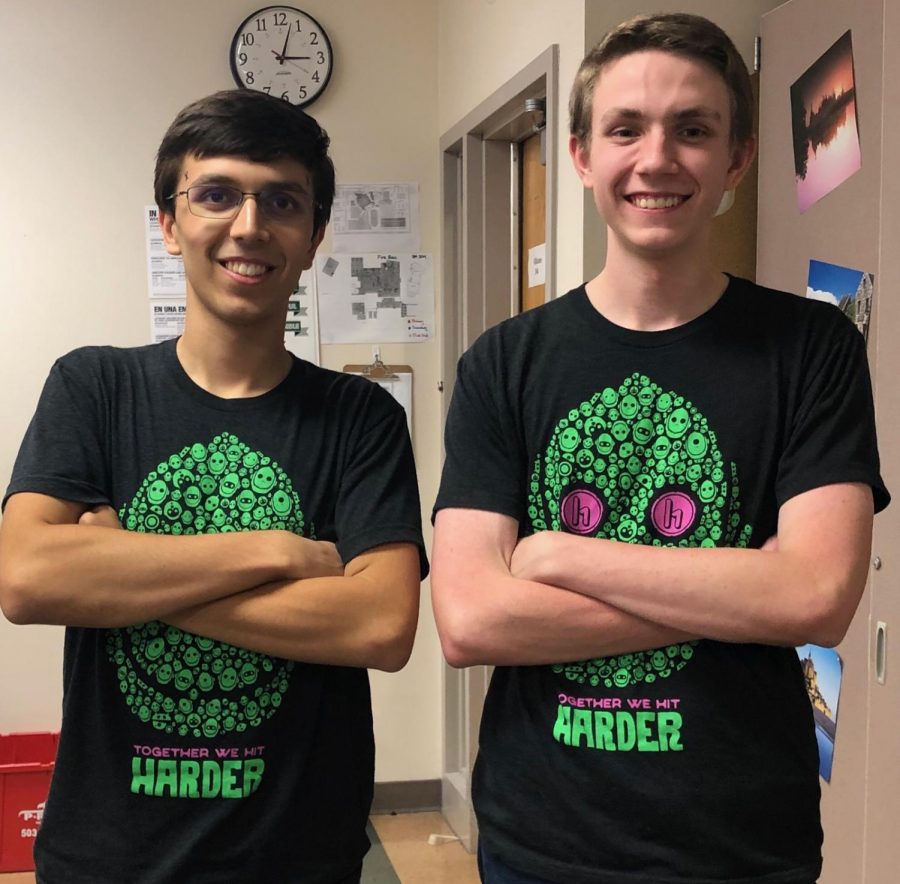Esau and Jobe crack the code
Seniors Aaron Jobe and Aaron Esau compete in the National Cybersecurity competition and finish in the top 10 globally
Seniors Aaron Jobe (left) and Aaron Esau (right) placed third in the US Western Region at CSAW this year. their team was also ranked the eight high school team globally.
December 2, 2019
Seniors Aaron Esau and Aaron Jobe were hard at work in September competing in a national cybersecurity competition; their efforts (which paid off in the form of a high qualifier ranking) are in part what inspired them to start up a cybersecurity club at Tigard High.
Cybersecurity Awareness Week (CSAW) is an event organized annually by the NYU Center for Cybersecurity and sponsored by several computer science institutions. The event is part of a larger celebration of National Cybersecurity Awareness Month, held every October in an effort to promote web safety and user security.
Esau and Jobe created their own team named “Red Tuxedo” to enter the 2019 CSAW Red Team Competition. The Red Team Competition is described on the CSAW website as a Jeopardy-style game of capture the flag (CTF)—instead of choosing questions to answer, teams choose a cybersecurity challenge to crack.
The objective in each challenge is to find a hidden “flag” file which represents a “captured flag” and a point for the team. This flag can only be found if the objective is completed successfully, which usually involves finding an exploit in a given program or bypassing a security protocol which normally blocks access to the flag.
Esau and Jobe had to juggle their workload between school and the competition in order to participate in the online qualifier rounds, which ran for an entire week at the end of September.
“We basically didn’t do any homework on weekends,” Jobe said. When the dust had settled, Red Tuxedo was ranked the eighth high school team globally and third in the US Western Region overall.
That’s a considerably high rank given over 300 high school and college teams competed in CSAW this year. Still, Jobe believes they struggled somewhat to manage their time and were thus unable to devote as much time to the competition as they would have liked.
“If we had invested more time in the weekend, [I think] we could have won,” Jobe said. On top of that, he and Esau claim one of the opposing teams engaged in foul play. All teams were meant to submit their solutions as soon as they were found so they could earn points in a timely manner—and so other teams could gauge their own progress based on how far their competitors were.
But Esau and Jobe say the team that ended up outpacing them did not submit any of their solutions until the tail end of the competition, allowing them to rack up their points without letting other teams clue in on their progress.
“We weren’t able to accurately gauge where they were, so we didn’t know how far we were supposed to be,” Esau said. Though he and Jobe did not land a finalist position and feel they could have done better, they are both satisfied with the rank they earned.
“I think we did pretty well,” Esau said. “If we had taken time off school, we probably could have caught up, but that week was very busy [for us].”
Esau and Jobe have always been passionate about computers. For Jobe, cybersecurity boils down to testing computers’ security protocol and learning how they can be improved by finding issues to resolve.
“I’ve always been interested in how computers work, and it seems like the easiest way to learn how they work is to try and break them,” Jobe said. Part of the excitement, he said, comes in being allowed to “break into” a computer for the sake of determining how it can be made more invulnerable to cyber attacks.
Esau, like Jobe, enjoys learning about cybersecurity through hands-on work—but the spark that led Esau to realize his passion for cybersecurity was more reckless in nature. Esau told of how he got into trouble numerous times for messing with the computers in middle school, but pursuing cybersecurity allowed him to take his curiosity in a more productive direction.
“In high school, I realized there are a lot of things you can do related to cybersecurity that don’t get you in trouble, like CTF competitions,” Esau said. Both he and Jobe are planning to major in a field related to computer science or electrical engineering. The two of them also aim to enter more cybersecurity competitions later on in the year armed with the knowledge they gained from CSAW.
Even without landing a finalist position, CSAW gave them both valuable experience toward their desired majors as well as any potential scholarships that may arise from their continued efforts. The biggest lesson Esau believes he learned was not to underestimate his competition, even in the collaborative world of computer science.
“We were not expecting the other team to play rough like they did,” Esau said. “We didn’t anticipate the poor sportsmanship, and if we had [I think] we would have won.”
Esau and Jobe formed a brand new cybersecurity club this year with the goal of training more students in programming and recruiting them for future CTF competitions. The Cybersecurity Club meets every other Friday.










